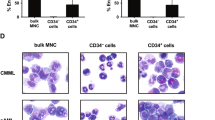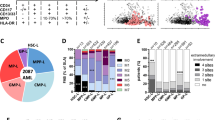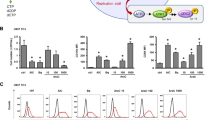Abstract
The vitamin D analogue KH1060 and the retinoids all-trans retinoic acid (ATRA), 9-cis-retinoic acid (9-cRA) and 4-hydroxyphenyl retinamide (4-HPR) induce differentiation and/or apoptosis and inhibit clonal growth of acute promyelocytic leukaemia cells. We have studied the effects of these agents in vitro on cells from 12 patients with other forms of acute myeloblastic leukaemia (AML). Treatment with KH1060 (10−6 M) caused decreases in cell viability in suspension culture to a median of 44% of control values (P = 0.02). However, retinoids had little effect. Subsequent clonal growth in semi-solid medium was inhibited to 5% (median) of control with 10−6 M KH 1060 (P = 0.03) and to 73% with 10−6 M 9-cRA (P = 0.01). Further inhibition of clonal growth by the combination of 5 × 10−7 M 9-cRA and 5 × 10−7 M KH1060 was only noted in one case. Following the primary suspension culture, cells from 6/6 CD34 positive samples grew in semi-solid cultures without analogues, whereas cells from 3/6 CD34 negative cultures grew. 10−6 M KH1060 completely abolished colony growth in all three CD34 negative samples and 10−6 M 9-cRA inhibited the number of colonies to a median of 11% of control values. In the six CD34 positive samples median colony growth was inhibited to 36% of control values by KH1060 and to 83% of control values by 9-cRA. CD11b expression was increased by 210% (median) with 9-cRA and by 90% (median) with KH1060 in early to intermediate myeloblast (M0, M1, M2) clones. A different pattern was noted in more mature (M4, M5, M6) clones: here there was little or no increase in CD11b expression induced by retinoids or KH1060, but the ratio of apoptotic to viable CD11b+ cells, measured by CD11b/7-AAD double staining, was increased in 6/6 cases treated with KH1060 or the combination of 9-cRA and KH 1060, and in 5/6 cases treated with 9-cRA. No overall significant change in bcl-2 or bax expression on G0/G1 cells was found after 3 days’ suspension culture with the analogues. However bcl-x was downregulated in G0/G1 cells treated with KH1060 (median bcl-x relative fluorescence intensity = 45.3 in cells treated with KH1060, compared with 65.7 in control wells, P = 0.028). We conclude that CD34+ samples are relatively resistant to the growth inhibition induced by KH1060 and 9-cRA. However, downregulation of bcl-x in cells which have survived treatment with KH1060 may increase the susceptibility of the remaining leukaemic cells to cytotoxic drugs.
This is a preview of subscription content, access via your institution
Access options
Subscribe to this journal
Receive 12 print issues and online access
$259.00 per year
only $21.58 per issue
Buy this article
- Purchase on Springer Link
- Instant access to full article PDF
Prices may be subject to local taxes which are calculated during checkout
Similar content being viewed by others
Author information
Authors and Affiliations
Rights and permissions
About this article
Cite this article
Pallis, M., Turzanski, J. & Russell, N. Blast maturity and CD34 expression determine the effects of the differentiating agents KH1060 and 9-cis-retinoic acid on the differentiation and clonogenicity of non-M3 acute myeloid leukaemia cells. Leukemia 12, 1741–1748 (1998). https://doi.org/10.1038/sj.leu.2401197
Received:
Accepted:
Published:
Issue Date:
DOI: https://doi.org/10.1038/sj.leu.2401197



